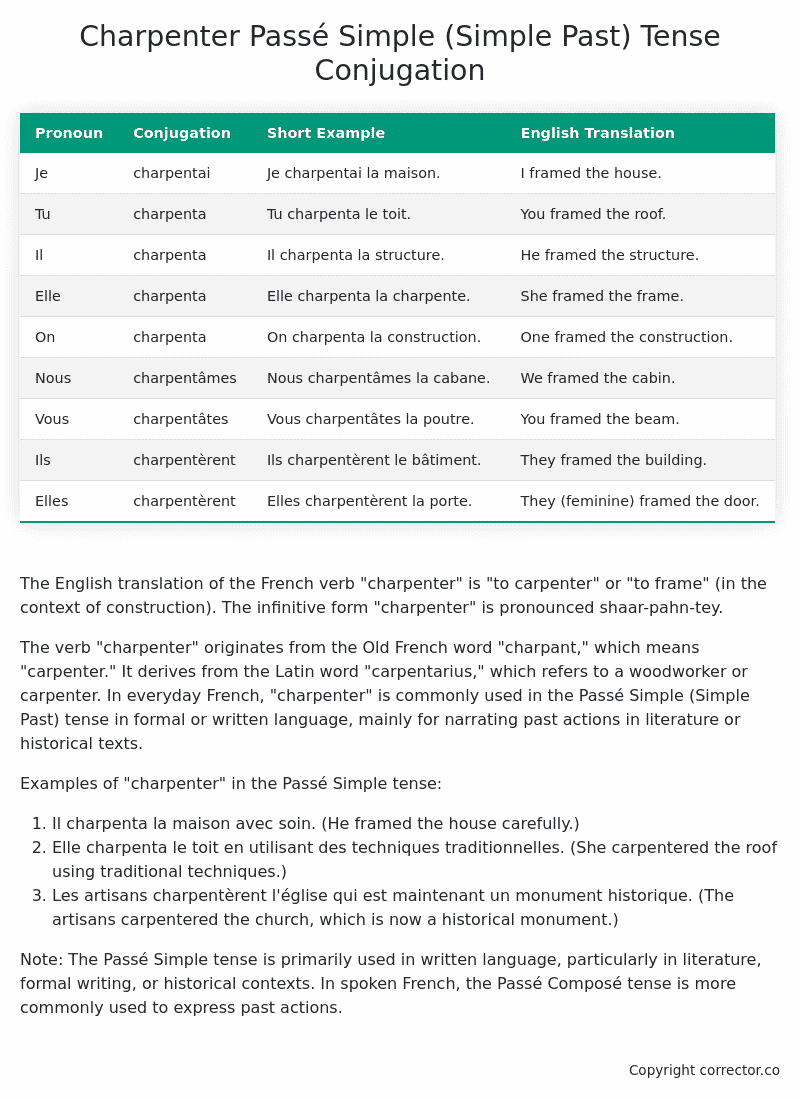Passé Simple (Simple Past) Tense Conjugation of the French Verb charpenter
Introduction to the verb charpenter
The English translation of the French verb “charpenter” is “to carpenter” or “to frame” (in the context of construction). The infinitive form “charpenter” is pronounced shaar-pahn-tey.
The verb “charpenter” originates from the Old French word “charpant,” which means “carpenter.” It derives from the Latin word “carpentarius,” which refers to a woodworker or carpenter. In everyday French, “charpenter” is commonly used in the Passé Simple (Simple Past) tense in formal or written language, mainly for narrating past actions in literature or historical texts.
Examples of “charpenter” in the Passé Simple tense:
- Il charpenta la maison avec soin. (He framed the house carefully.)
- Elle charpenta le toit en utilisant des techniques traditionnelles. (She carpentered the roof using traditional techniques.)
- Les artisans charpentèrent l’église qui est maintenant un monument historique. (The artisans carpentered the church, which is now a historical monument.)
Note: The Passé Simple tense is primarily used in written language, particularly in literature, formal writing, or historical contexts. In spoken French, the Passé Composé tense is more commonly used to express past actions.
Table of the Passé Simple (Simple Past) Tense Conjugation of charpenter
| Pronoun | Conjugation | Short Example | English Translation |
|---|---|---|---|
| Je | charpentai | Je charpentai la maison. | I framed the house. |
| Tu | charpenta | Tu charpenta le toit. | You framed the roof. |
| Il | charpenta | Il charpenta la structure. | He framed the structure. |
| Elle | charpenta | Elle charpenta la charpente. | She framed the frame. |
| On | charpenta | On charpenta la construction. | One framed the construction. |
| Nous | charpentâmes | Nous charpentâmes la cabane. | We framed the cabin. |
| Vous | charpentâtes | Vous charpentâtes la poutre. | You framed the beam. |
| Ils | charpentèrent | Ils charpentèrent le bâtiment. | They framed the building. |
| Elles | charpentèrent | Elles charpentèrent la porte. | They (feminine) framed the door. |
Other Conjugations for Charpenter.
Le Present (Present Tense) Conjugation of the French Verb charpenter
Imparfait (Imperfect) Tense Conjugation of the French Verb charpenter
Passé Simple (Simple Past) Tense Conjugation of the French Verb charpenter (You’re reading it right now!)
Passé Composé (Present Perfect) Tense Conjugation of the French Verb charpenter
Futur Simple (Simple Future) Tense Conjugation of the French Verb charpenter
Futur Proche (Near Future) Tense Conjugation of the French Verb charpenter
Plus-que-parfait (Pluperfect) Tense Conjugation of the French Verb charpenter
Passé Antérieur (Past Anterior) Tense Conjugation of the French Verb charpenter
Futur Antérieur (Future Anterior) Tense Conjugation of the French Verb charpenter
Subjonctif Présent (Subjunctive Present) Tense Conjugation of the French Verb charpenter
Subjonctif Passé (Subjunctive Past) Tense Conjugation of the French Verb charpenter
Subjonctif Imparfait (Subjunctive Imperfect) Tense Conjugation of the French Verb charpenter
Subjonctif Plus-que-parfait (Subjunctive Pluperfect) Tense Conjugation of the French Verb charpenter
Conditionnel Présent (Conditional Present) Tense Conjugation of the French Verb charpenter
Conditionnel Passé (Conditional Past) Tense Conjugation of the French Verb charpenter
Conditionnel Passé II (Conditional Past II) Tense Conjugation of the French Verb charpenter
L’impératif Présent (Imperative Present) Tense Conjugation of the French Verb charpenter
L’impératif Passé (Imperative Past) Tense Conjugation of the French Verb charpenter
L’infinitif Présent (Infinitive Present) Tense Conjugation of the French Verb charpenter
L’infinitif Passé (Infinitive Past) Tense Conjugation of the French Verb charpenter
Le Participe Présent (Present Participle) Tense Conjugation of the French Verb charpenter
Le Participe Passé (Past Participle) Tense Conjugation of the French Verb charpenter
Struggling with French verbs or the language in general? Why not use our free French Grammar Checker – no registration required!
Get a FREE Download Study Sheet of this Conjugation 🔥
Simply right click the image below, click “save image” and get your free reference for the charpenter Passé Simple tense conjugation!

Charpenter – About the French Passé Simple (Simple Past) Tense
Formation
Usage
Narration
Historical Context
Interactions with other tenses
Passé Composé
Imparfait
Conditional and Subjunctive
Summary
I hope you enjoyed this article on the verb charpenter. Still in a learning mood? Check out another TOTALLY random French verb conjugation!


